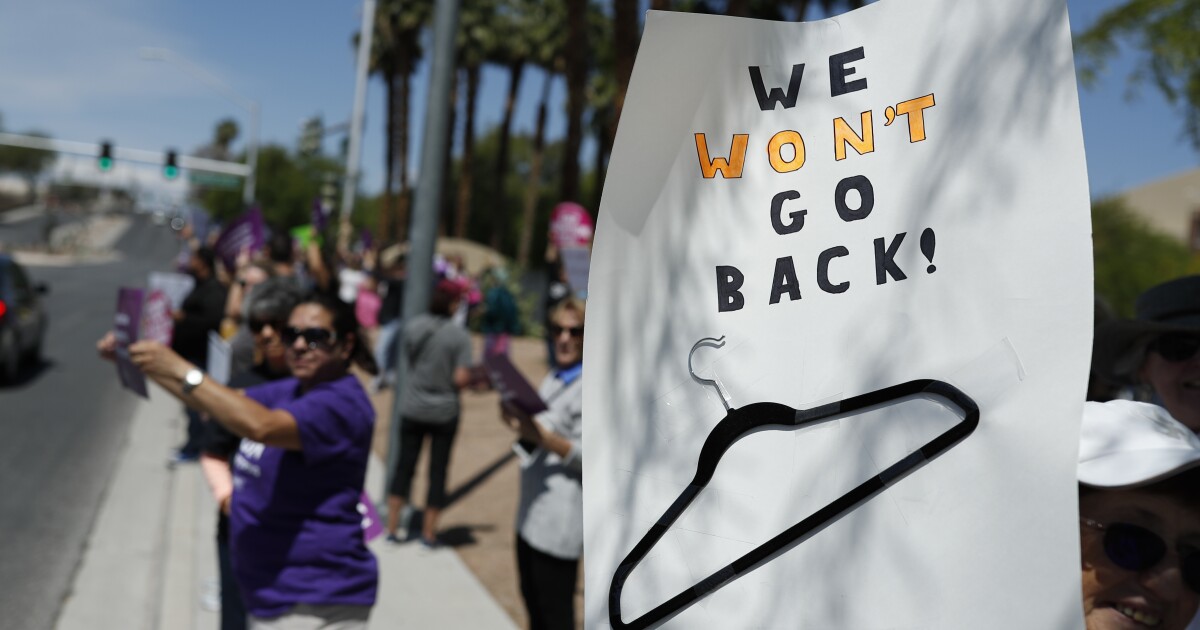

Seven states are battling over abortion rights amendments to their constitutions, with Nevada being the most recent state to join that pack on Thursday.
Abortion rights activists in the majority of these states have positioned their petition-initiated amendments to be put on the ballot in 2024. Ohio is the only state to vote on an abortion amendment this November.
AOC SHOUTED DOWN WHILE SPEAKING TO NEW YORKERS ABOUT ILLEGAL IMMIGRANTS FLOODING THEIR CITY
Political analysts theorize that having abortion amendments in the 2024 election cycle will galvanize Democratic voters and increase overall election participation, much like the overturning of Roe v. Wade affected the November 2022 midterm elections.
The language of the amendments in each state is slightly different as the abortion rights movement struggles over whether to aim for unfettered abortion access or to allow limits after viability, or the point at which a fetus is likely to survive outside the womb.
Here are the details of each state’s proposed amendment for the 2024 ballot that you need to watch:
Arkansas
In August, an unnamed citizen unofficially filed an amendment petition that stipulates that the state “shall not prohibit, penalize, delay, or restrict access to abortion before viability” and defined viability as “when the pregnant patient’s physician determines the fetus is likely to survive outside the uterus without extraordinary medical measures.”
Arkansas currently has one of the strictest abortion bans in the country, with only exceptions for the life of the mother in emergency situations.
Arizona
Arizonans for Abortion Access filed proposed language in August for an abortion ballot measure in 2024. The PAC will have until next July to collect the nearly 400,000 signatures to have a spot on the ballot.
Currently, the state only allows for abortion up to 15 weeks gestation, which is typically considered the point at which a fetus can feel pain. Gov. Katie Hobbs (D-AZ) issued an executive order on the one-year anniversary of the Dobbs v. Jackson Women’s Health Organization putting abortion prosecution into the state attorney general’s jurisdiction, essentially decriminalizing abortion. Hobbs has said she will not “allow extreme and out of touch politicians to get in the way of the fundamental right Arizonans.”
Florida
GOP presidential hopeful and Gov. Ron DeSantis (R-FL) signed a bill in April banning abortion after 6 weeks gestation, which is medically recognized as when the unborn child has a recognizable heartbeat. In May, the activist group Floridians Protecting Freedom, supported by Planned Parenthood and other organizations, began efforts to challenge the implementation of the bill and proposed a constitutional amendment protecting abortion.
According to the group’s website, their goal is to galvanize supporters for “creating a constitutional amendment that explicitly blocks the implementation of laws that prohibit, delay, or restrict abortion access.
Missouri
Missouri had a “trigger law” that took effect shortly after the Supreme Court overturned Roe, banning abortion except in the cases of medical emergencies.
There are 11 different texts for the proposed amendment that would legalize abortion in Missouri, but all versions of the amendment define reproductive freedom as “the right to make and carry out decisions about all matters relating to reproductive healthcare, including but not limited to prenatal care, childbirth, postpartum care, birth control, abortion care, miscarriage care, and respectful birthing conditions.”
There are several lawsuits against the amendment working their way through the courts, including one that challenges the financial impact statement that explains how the measure would affect the state’s budget. The plaintiffs in that case argue the amendment would negatively affect Missouri’s Medicaid program.
Nebraska
The political action committee Protect Our Rights filed paperwork in Nebraska in August to initiate an amendment to secure abortion access, the language of which has not yet been proposed.
The group will need to collect signatures from 10% of the state’s registered voters, possibly less than 123,000 people, according to recent election data. These signatures must also amount to 5% of the registered voters across 38 of Nebraska’s 93 counties.
A state abortion ban after 12 weeks gestation is set to take effect on Oct. 1.
Nevada
A coalition of abortion rights groups, including Planned Parenthood, NARAL Pro-Choice Nevada, and the American Civil Liberties Union of Nevada, filed a petition on Thursday to secure a ballot question regarding abortion on the November 2024 ballot. The groups will need to collect 103,000 signatures by next June to secure a spot. If passed, the measure will need to be voted on again in 2026, per Nevada’s rules regarding constitutional amendments.
Abortion in Nevada has been legal up until 24 weeks gestation since 1990, when the public codified the provision into law by ballot initiative.
CLICK HERE TO READ MORE FROM THE WASHINGTON EXAMINER
South Dakota
Abortion is entirely banned in South Dakota except in cases where the mother’s life is at risk. The proposed amendment would enable the state to restrict abortion after the first trimester “only in ways that are reasonably related to the health of the pregnant woman.” After the second trimester, the state may take further steps to regulate abortion, but a physician may deem the procedure necessary “to preserve the life or physical or emotional health” of the mother.
Dakotans for Health, the organizers behind the potential 2024 ballot measure, must collect verified signatures equal to up to 10% of the turnout in the 2023 gubernatorial election this November.





